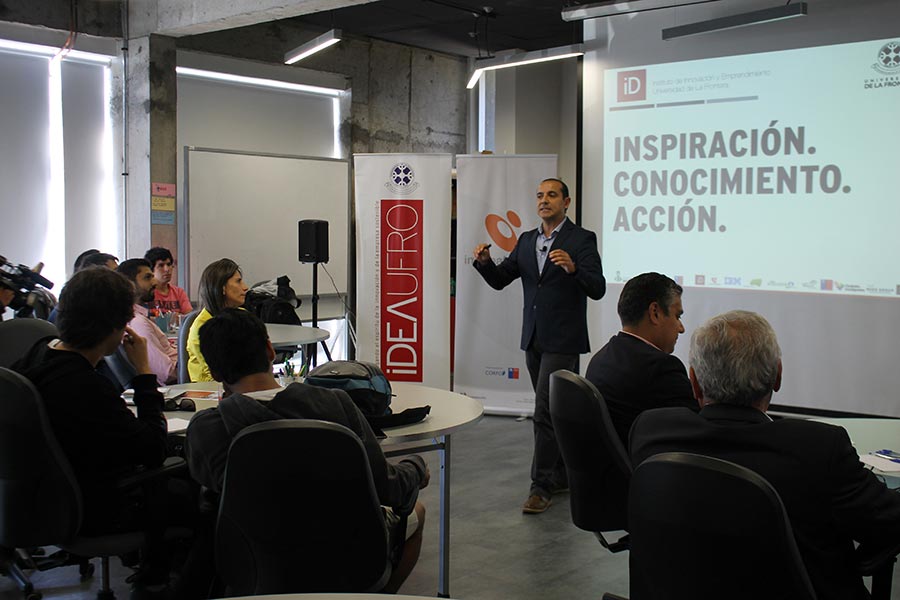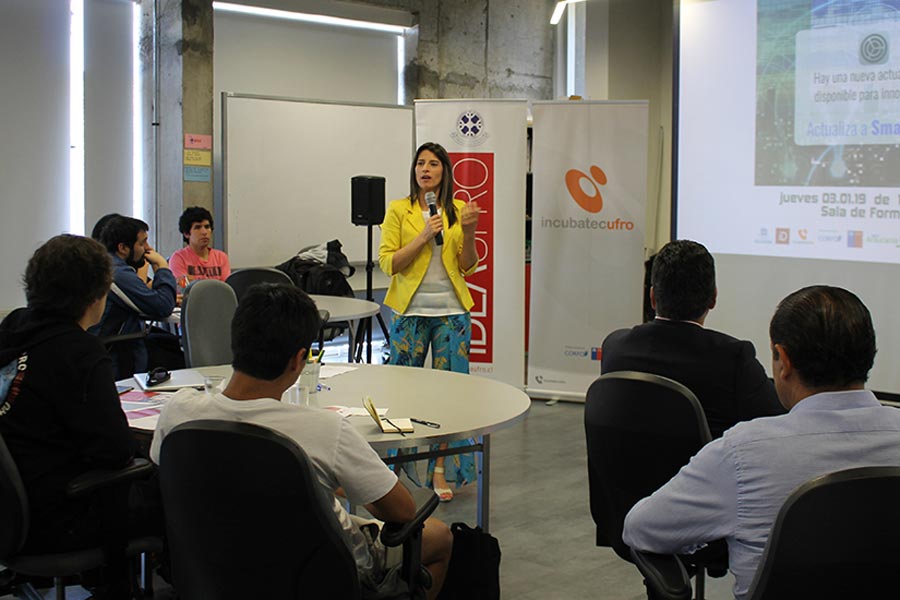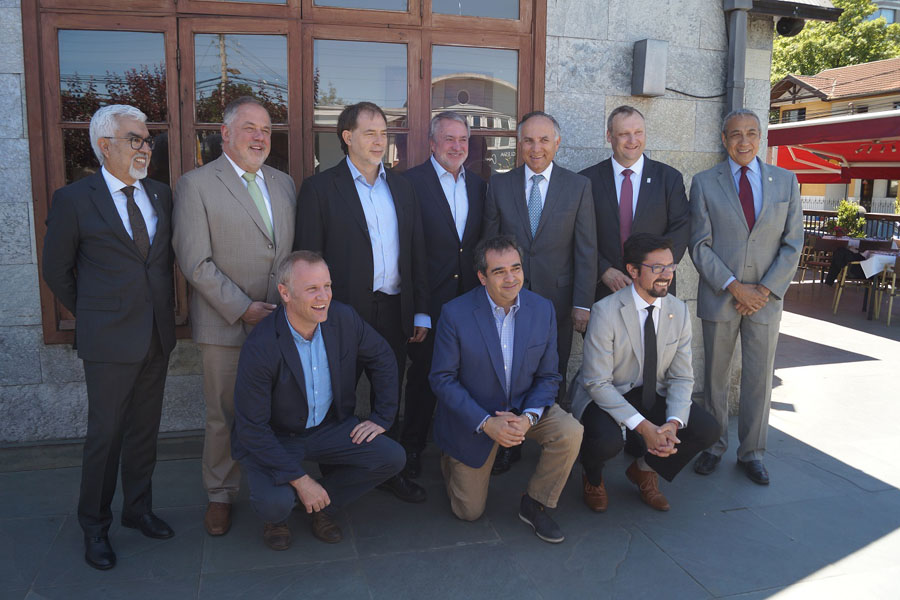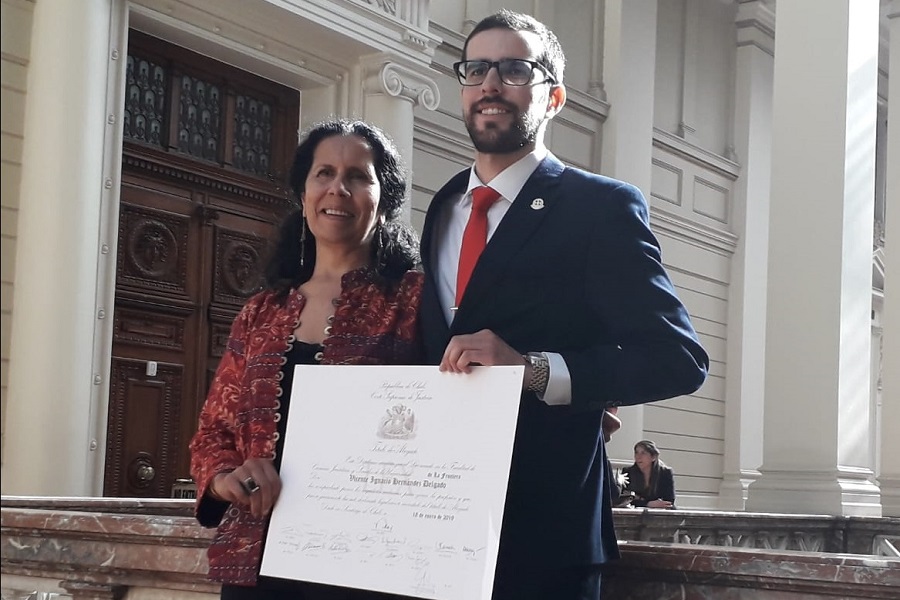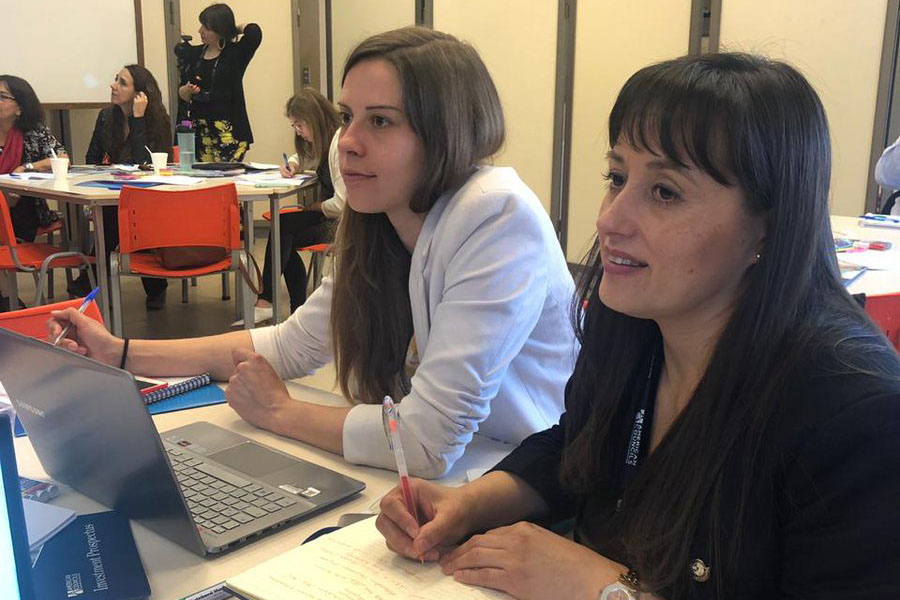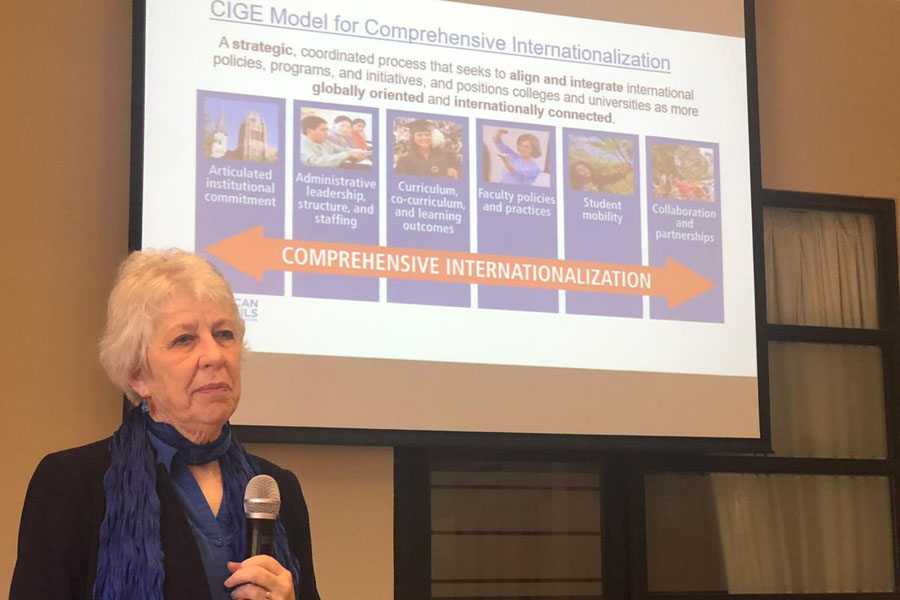|
The Smart Day was the moment chosen by the UFRO and CORFO to present the “Smart Mobility 2020” strategy, which is part of the Chilean strategy of the Smart City project. The Universidad de La Frontera will participate in this strategy via the incubation of technological services through Conexity funds and the training of professionals in a further education program in Innovation and e-business, which starts in April. |
The continuous development of technologies and its use regarding Big Data, artificial intelligence and the Internet of Things, etc., have transformed the way of how we connect and interact with our environment and are also creating a new understanding of business and entrepreneurship, accelerating the needs of the country to have human capital that is able to work in the environment of Industry 4.0, with new capabilities and knowledge. IDEAUFRO, together with IncubatecUFRO and the support of CORFO, launched an action plan that starts in 2019 with the Smart Day, an open invitation for tech entrepreneurs and experts, such as Nicolás Grandón, who is in charge of the Smart Cities Unit of the Ministry of Transportation and Telecommunications in Chile, in order to discuss the digital transformation of business and value creation through collective intelligence. Isaacs emphasized the networking between public and private institutions that participated in this initiative and the ones who will be part of the first generation of students in the further education program “Digitalization and New Businesses, Industry 4.0”, which the UFRO will start together with IBM and the Waterworks Aguas Araucanía, and the support of CORFO. “The classes of this program start in April 2019, with high-level teachers, such as the Indian scientist Damodarán Ramán, renowned for the development of rocket and satellite components and algorithms in the aerospace industry of his country,” Isaacs stated. INTELLIGENT CITIES Responding to the worldwide tendency to make use of solutions of collective intelligence and connected citizens, the Ministry of Transportation and Telecommunications in Chile made use of this possibility to present the Smart City strategy “Smart Mobility 2020”, which will be tested in six Chilean cities – Temuco is one of them – and seeks to support the creation, development and validation of technological endeavors in early stages, which address the global challenges of smart cities related to the environment, quality of life and smart economy. For this purpose, CORFO launched a fund of 180 million Chilean pesos in the Araucanía Region for the launch of technological initiatives that offer solutions for the different challenges that are part of smart cities. This is how the program Conexity, launched by Incubatec UFRO, joins the idea to use the region as a natural laboratory for testing new developments and endeavors that solve the critical challenges of a smart city with the help of technology. “The purpose is to develop technological prototypes and to put into practice some of the proposals of our regional entrepreneurs, in order to find pilot solutions that contribute to the establishment of a Smart City and the regional industry, through trial and error method,” Claudina Uribe, the director of Incubatec UFRO of the Universidad de La Frontera, said. She also emphasized that this program, which will be carried out during twelve months, responds to the strategic guidelines the UFRO is working on for some years, regarding the development and training of high-quality professionals and human capital, with technological tools for their professional improvement and which they can make use of.
Escrito por: Communications Office
|
|
Within three days, the UFRO reached a number of 2,273 new students matriculated and fills all the vacancies in the process of admission. |
The Universidad de La Frontera consolidates its leadership regarding prestige and quality within the group of Universities of Excellence in Chile by filling 100% of the total vacancies in the first matriculation stage 2019. It only took three days to reach a total of 2,273 new students matriculated, a number that corresponds to the total of vacancies in this admission process, which took place at the Olympic Stadium of the Universidad de La Frontera. 80% of the new UFRO students come from the Araucanía Region – 32% of them from municipal schools, and 29% of Mapuche descent. Regarding inclusion, the numbers show that 49% of the new UFRO students are women, 7% are persons with disabilities, and 6 students have nationalities other than Chilean. “The matriculation process is one of the most important moments for our university in terms of management. This is why it is very comforting to see that the work of all of us as one team allows us to reach our goals. I want to thank each and every one of the units that have been working to achieve the objective for their efforts and dedication,” the rector, Dr. Eduardo Hebel, said to the hundreds of senior students, professionals, academics and directors who have been working in the matriculation process 2019. One of the keys for the success of this year´s matriculation process were the capabilities and coordination of the different units that participated in the matriculation process: matriculation teams, cahiers, promotion of study-programs, student development, comprehensive training, informatics, institutional analysis, the programs PACE and “I want to be a teacher”, finances, communications and general services. And last but not least, the directors and staff of the Aula Magna and the Olympic Stadium who provided their spaces to carry out the activities.  Written by: Communications Office UFRO Written by: Communications Office UFROThis email address is being protected from spambots. You need JavaScript enabled to view it. |
|
The Congress will bring world-level experts together in Temuco, on January 16, 2019. |
More than three hundred people are expected to come to Temuco to attend this year’s version of the Congress of the Future in the Araucanía Region (“Congreso Futuro Araucanía 2019”). Four world-renowned speakers will give interesting master classes in this event, which is organized by the Senate of the Republic of Chile with support of the regional universities and the municipal government, on January 16, at the La Araucanía Pavilion. The event, which will be replicated in ten regions of the country, has turned into a reference at the Latin-American level and the world-level and therefore, according to Guido Girardi, the senator and president of the Committee Challenges of the Future, it is very important that the regions can invite scientists from more advanced countries to Chile. He added: “Humanity, the citizens and politics are having a mayor challenge these days: we are illiterates regarding the irruption of technology and the ecological crisis we are living in, and that is why it is important to act. It is essential to bring politics and science together, the universities and the citizens, in order to discuss together. The Congress of the Future seeks to be a space where our intellectual leaders, our universities, which are the most important centers of thoughts, can be the main actors.” The mayor, Jorge Atton, said that this event is very important for the Araucanía Region: “The fact that the universities that have their head offices in our region are working together is very essential.” An opinion the rectors of the other universities also share. Aliro Bórquez of the Universidad Católica of Temuco affirmed: “It is very important to motivate these young people regarding research and science. We are convinced that this is the key for the development of our region. The Araucanía Region is a big natural laboratory and offers them great opportunities.” The rector of the Universidad de La Frontera, Dr. Eduardo Hebel, said: “We, the universities, have to work together on projects, from a scientific point of view. Associativity is the future of science in the future, which will hold strong results in the sense of being able to provide our regional community with the results of our research.” Teodoro Ribera is the rector of the Universidad Autónoma de Chile. He emphasized the role the senator Girardi and the mayor Atton have had regarding the needs of the Araucanía Region and the relevant topics for the future. “The university does not only train human resources, but also researches, plans and helps. This region cannot keep being involved in the conflict we are having today. We have to strengthen partnerships and fraternity. In this region, no one is dispensable. It does not matter where you come from, what matters is where you want to go. I think that this region wants peace, wants development, and that has to be a joint effort, something we build from day to day.” CONFERENCES IN TEMUCO The congress includes four conferences on volcanology, the cities of the future, and astronomy. One of the speakers is Clive Oppenheimer, a British volcanologist, professor of volcanology at the University of Cambridge, and filmmaker. His research fields are volcanic processes and dangers, and the consequences for nature and society regarding major eruptions in the past. He spent thirteen field seasons studying Mount Erebus in Antarctica. His contributions are each time more a nexus of natural science, arts and humanities. He made the film “Into the Inferno” (Netflix 2016) together with Werner Herzog. Javier Villar Ruiz will hold another conference. He is a Spanish architect, associate and Design Chief at Kengo Kuma & Associates (KKAA), with broad experience from projects in Spain, Brazil, Japan, South Korea, Belgium, Switzerland, France and Hungary. At the moment, he is working on the construction of the Olympic Stadium, which will be the venue of the Olympic Games in Tokyo in 2020. Another conference will be held by Catherine Cesarsky, a top-level advisor in astrophysics for the French Alternative Energies and Atomic Energy Commission (CEA). Among other international activities, she is Chair of the SKA board of directors, which is building the biggest radio telescope in the world to explore the universe. Her conference in Temuco will be about “The evolution of galaxies according to observations at ALMA and ESO”. And the fourth speaker is Adele Plunkett, an astronomer at Yale University. She has been working for the European Southern Observatory (ESO) and the Atacama Large Millimeter Array (ALMA) in Chile. She is a researcher at the National Radio Astronomy Observatory (NRAO) in the USA since 2018 and is working on an astronomical project at ALMA in the north of Chile. Her fields of research are star formations and her studies include the observation of young stars with radio telescopes. In the conference, she will talk about the privileges of Chile in this field and about the solar eclipses in Coquimbo and the Araucanía Region in Chile in 2019 and 2020. In parallel, there will be scientific recreational activities offered by Explora Conicyt, the Science Communication Center of the Universidad Autónoma de Chile and researchers of the Universidad Católica de Temuco. The congress will also be transmitted via online streaming by the different institutions involved.
Escrito por: Communications Team
Congreso Futuro Araucanía 2019 |
|
Vicente Hernández Delgado is the face of a milestone for the Universidad de La Frontera that consolidates the history of prestige and quality in the training of professionals at the Faculty of Law and Business. |
Vicente Hernández Delgado took his oath before the Chilean Supreme Court on Friday, January 18, and became the first lawyer graduated from the Universidad de La Frontera. He was born and raised in the south of Chile in the region Aysén and entered university in 2012, enrolling in the Faculty of Law and Business (FCJE) for his professional training and comprehensive development. “This is a milestone in the history of our university, the Faculty of Law and Business and the Law School. It is a highlight for this academic flagship project in the Araucanía Region and at the national level,” Valeska Geldres, the FCJE dean, said. She also emphasized: “As the dean and in representation of the faculty community, I want to show Vicente our appreciation for his exemplary way of acting and for giving meaning to the purpose of our faculty: to train professionals who, through merit and hard work, break the cycle of inequality and provide the country and the regions with their talent while, at the same time, making their personal dreams come true by pursuing their profession.” At the institutional level, it has been seven years of work, committed to the academy, for making this success possible. We are celebrating the first law graduate, with an outstanding performance and who always was intellectually anxious and interested in the topics that concern this country.
 Written by: Karen Campos Written by: Karen CamposFaculty of Law and Business |
|
Thanks to the inter-university project U.S. - Chile University Partnerships Program, four universities in the south of Chile are strengthening their skills regarding respective internationalization strategies. |
As a part of the U.S. - Chile University Partnerships Program, a delegation of the UFRO participated in the first session of activation and development of capabilities to achieve the internationalization of universities in the south of Chile. The director of the International Affairs Office, Dr. Pamela Leal, was the leader of the UFRO delegation that got to now the best practices to design and implement internationalization strategies with US-American institutions, presented by three outstanding expert speakers in processes of internationalization. “This is the first time that our university participates in such a workshop with professionals and academics of several fields: technology transfer, strategic planning, communications and international affairs. This helps us to reduce the natural gaps between understanding internationalization and finding ambassadors to implement the strategies inside our university with a comprehensive and transversal point of view,” Dr. Pamela Leal commented. During the three days of work, the main objective was to understand the comprehensive model of internationalization that sees this issue as a central point in the tasks of a university and wants to stop the idea of isolated silos, which is very common in the university system. “For me, the most valuable thing was to get to know the model of internationalization and its dimensions of action that invites all the members of our university community to be agents, promoters and initiators of internationalization, designing a road map that takes the best practices, the proper competencies of the institution and the questions of why to internationalize and for what, into account,” Carola Espinoza, the director of the Communications Office, said. Dr. Ricardo Herrera, the director of the Office for Institutional Analysis and Development, commented that, in his opinion, the most valuable of the workshop was to “confirm that the one-dimensional models and compartmentalization are not sufficient to show the complexity of internationalization at a university. It needs a holistic, comprehensive and systematic approach, apart from a clear policy direction in this field.” The executive director for International Projects and coordinator of the program Connecting of the Office for Innovation and Technology Transfer at the UFRO, Janina Hanswillemenke, assured: “The experience of the United States in the fields of international relations and international research provides us the opportunity to implement a comprehensive and holistic model of internationalization at our university that does not only connect the internal units that are involved in the field of internationalization, but also concentrates on the generation of strategic networks with valuable external entities, such as, for example, international universities or financial establishments.” The workshop took place from December 11 to 13, 2018, at the Universidad Católica de la Santísima Concepción in Chile, with participation of delegations of the universities Universidad Bío Bío, Universidad Austral, Universidad de La Frontera and Universidad Católica de Santa María (Peru).
Written by: Communications Office
|





